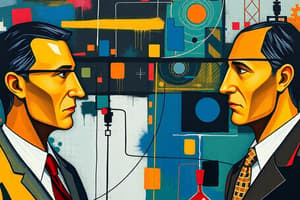Podcast
Questions and Answers
Which of the following best describes the core principle behind pro bono work in engineering?
Which of the following best describes the core principle behind pro bono work in engineering?
- Addressing the under-representation of low-income individuals in engineering.
- Offering technical expertise to those who cannot afford it. (correct)
- Ensuring engineers are shielded from liability during charitable work.
- Promoting volunteerism among engineering students for resume building.
The concept of social justice in engineering primarily focuses on minimizing environmental impact of engineering projects.
The concept of social justice in engineering primarily focuses on minimizing environmental impact of engineering projects.
False (B)
Besides gender and racial/ethnic diversity, what is one other 'non-visible' diversity issue prevalent within the engineering workforce?
Besides gender and racial/ethnic diversity, what is one other 'non-visible' diversity issue prevalent within the engineering workforce?
socio-economic status
A key statement of ethical practice involves use of knowledge and skills for the benefits of the community to create engineering solutions for a ________ future
A key statement of ethical practice involves use of knowledge and skills for the benefits of the community to create engineering solutions for a ________ future
Match the following ethical considerations with their descriptions:
Match the following ethical considerations with their descriptions:
Which of the following best describes the primary focus of occupational ethics for engineers?
Which of the following best describes the primary focus of occupational ethics for engineers?
Engineers generally work independently, with minimal need for interaction rules or teamwork.
Engineers generally work independently, with minimal need for interaction rules or teamwork.
Name the four classifications of interaction rules that outline expected behaviors between engineers, other individuals, and society as a whole.
Name the four classifications of interaction rules that outline expected behaviors between engineers, other individuals, and society as a whole.
A system of rules and punishments established by a society to maintain safety and order is known as ______.
A system of rules and punishments established by a society to maintain safety and order is known as ______.
Which of the following is considered the engineering profession's primary social responsibility, according to worldwide codes of ethics?
Which of the following is considered the engineering profession's primary social responsibility, according to worldwide codes of ethics?
Environmental protection is not typically included as part of the social responsibilities outlined in engineering codes of ethics.
Environmental protection is not typically included as part of the social responsibilities outlined in engineering codes of ethics.
Match the interaction rule with its description:
Match the interaction rule with its description:
Why is the preservation of the environment considered ultimately an act of 'self-preservation' for humanity?
Why is the preservation of the environment considered ultimately an act of 'self-preservation' for humanity?
Flashcards
Occupational Ethics
Occupational Ethics
Guiding principles of behavior in the workplace.
Etiquette
Etiquette
Rules of acceptable behavior in social settings.
Laws
Laws
Rules and punishments defined by a society.
Morals
Morals
Signup and view all the flashcards
Ethics
Ethics
Signup and view all the flashcards
Human Safety
Human Safety
Signup and view all the flashcards
Environmental Protection
Environmental Protection
Signup and view all the flashcards
Sustainability
Sustainability
Signup and view all the flashcards
Engineering Ethics: Community Benefit
Engineering Ethics: Community Benefit
Signup and view all the flashcards
Pro Bono Work
Pro Bono Work
Signup and view all the flashcards
Social Justice
Social Justice
Signup and view all the flashcards
Diversity Issues in Engineering
Diversity Issues in Engineering
Signup and view all the flashcards
Pro Bono Engineering Examples
Pro Bono Engineering Examples
Signup and view all the flashcards
Study Notes
- Engineers must uphold high ethical standards in their professional conduct.
- Occupational ethics are the guiding principles for ethical behavior in the workplace.
- Civil engineers often perceive ethics as a mere concept, relying on moral judgment for ethical decisions.
- When facing unethical situations, they typically try to convince their managers otherwise.
- Ethics and ethical reasoning are crucial in engineering and can impact life and death situations.
Interaction Rules of Behavior
- Engineers usually work in teams.
- A set of interaction rules is needed to outline expected behavior between the engineer, other individuals, and society.
- Interaction rules include etiquette, law, morals, and ethics.
- Etiquette: Rules of acceptable personal behavior and courtesy in social settings.
- Laws: Rules and punishments defined by society to maintain order, with consequences like imprisonment, fines, or even death.
- Morals: Personal rules of right and wrong derived from upbringing, beliefs, and societal influences.
- Ethics: A code defining moral behavior for a particular society, often formalized by professional societies.
Social Responsibilities of the Engineering Profession
- Public trust requires engineers to consider their impact on human safety.
- Protecting public safety, health, and welfare is a primary duty.
- Engineering codes include environmental protection among social responsibilities.
- Preserving the environment is essential for human survival.
- Engineers should use their skills to create sustainable solutions for the benefit of the community.
- Promoting sustainability is a key ethical practice.
- Pro bono work involves donating technical expertise to those who cannot afford it which is encouraged for charitable causes and emergencies.
- Social justice relates to the distribution of wealth and privileges, as well as poverty and development issues.
- Engineering social responsibility encompasses social justice issues.
- The engineering workforce lacks diversity, being predominantly male and lacking racial/ethnic diversity.
- Diversity issues also relate to socio-economic status, cognitive types, and personality types.
- Fair compensation of workers, regardless of gender or race, is a crucial aspect of diversity.
Studying That Suits You
Use AI to generate personalized quizzes and flashcards to suit your learning preferences.
Description
Explore the ethical standards vital for engineers in their professional roles. Understand occupational ethics as guiding principles in the workplace. Learn about interaction rules—etiquette, laws, morals, and ethics—that shape behavior among engineers, individuals, and society.




